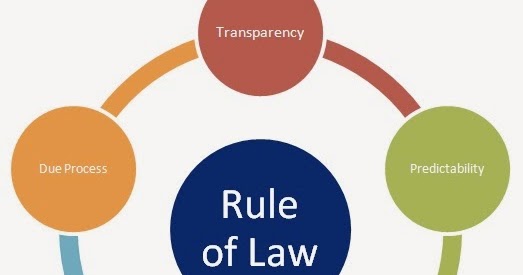Rule of Law in Nigeria: Principles and Limitations
The principle of the rule of law arose from the proposition by professor Dicey in his book titled “Introduction to the law of the constitution in 1885”. He wrote that the administrators of a country should rule or exercise their authority in accordance with the established laws of the land, and such established laws should be regarded as supreme.

This means that the law should be supreme to both the government and the governed.
Main Features/Principles of the Rule of Law
- The law is supreme to both the government and the governed.
- Both the rulers and the ruled are equal before the law irrespective of the social status of anyone in the society.
- No one should be unduly punished until he has gone through the due process of law, or normal trial in the ordinary court of law. An accused is presumed innocent until he has been found guilty by the court of law.
- The state must not deprive it’s citizens of such fundamental rights and basic freedoms such as: right to life, right to personal liberty, freedom of speech and association, which are not necessarily derived from the constitution, but are natural or inalienable.
- The law should be clearly spelt out and must not be kept secret. An accused person must be given the right to appeal against my judgement he deems wrong.
- An accused person should be allowed to choose his defence counsel, who should have access to all the relevant documents that might assist in the preparation of his case.
- Retroactive law, i. e. Laws regarded as having taken before enactment, should not be passed. Every law should take effect from the date of enactment or sometime after.
- Government must rule in accordance with the provisions of the constitution. The views or actions of an individual must not be violate the fundamental rights of citizens as entrenched in the constitution. Illegal polices and actions of the government and it’s agencies must be declared null and void by the judiciary.
- The law must be reasonable in its basis as well as application.
- Everyone must be certain that a breach of law will incur strictly laid down sanctions, and there must be a system of detection of breaches.
- The legal system must move with the general development of the people.
Limitations To The Rule of Law
The concept of rule of law is limited in the area of application because of the following:
- Diplomatic immunity: International law, foreign diplomat are not tried under the laws of their host countries. They could, however, be declared persona non grata and asked to leave the country.
- Parliamentary immunity: Parliamentarians cannot be charged to court for their utterance during parliamentary session.
- Delegated legislature: The application of delegated legislation violates the principle of the rule of law. Top government functionaries often make orders and rules which might violate the right of other citizens.
- Administrative tribunals: The establishment of administrative tribunals violates the rule of law, as budges it.
- Inadequate independence of the judiciary: The independence of the judiciary is necessary for effective application of the rule of law. However, judges are often appointed by the executive arm of government. It Is felt that this dose do not enable them to fully discharge their duties without fear or favor.
- Immunity of judges: Judges can not be tried, judicial pronouncements could therefore sometimes be based on the personal interest of judges rather than the established laws of the land.
- Illiteracy and ignorance: These are apparently the most important factors limiting the operation of the rule of law, because the level of literacy determines the ability of citizens to uphold and defend their right.
- State of emergency: The declaration of the State of emergency, can sometimes happens will limits the application of the rule law because many rights are curtailed at such period.
Factors that Can Ensure The Operation of the Rule Of Law
1. The judiciary must be free from the control of the ruling government. For instance, the executive should not be allowed to appoint judges into the law courts. Rather, a body such as the judicial service commission should be empowered to appoint judges. This would help to maintain judicial independence and neutrality.
2. The remuneration of judges should be free from executive control. Judges should also be paid adequate salaries and allowances to attract and retain the right caliber of people at the bench.
3. Provisions should be made for the right of appeal. The right of appeal helps to straighten the citizens belief in the judiciary and the rule of law.
4. The citizens must understand their right and be prepared to defend them.
5. Adequate publicity should be given to the law to enable the citizens to know their right and limitations.
6. The fundamental human right of citizens must be entrenched in the constitution to safeguard the liberties of the citizenry.
7. The mass media should be allowed to assess and criticize public policies and programmes, to enable them to protect the interest of the citizens.
8. The principle of separation of powers should be followed to avoid conflict between the major arms of government, and possibly check the excesses of each arm. The checks and balances inherent in the principle would not help to eliminate the emergence of authoritarian and tyrannical rule.
9. Trial of suspects must not be secretly conducted, but in public where they could be represented by defence lawyers of their choice and justice would not be done, but seen to have been done.
